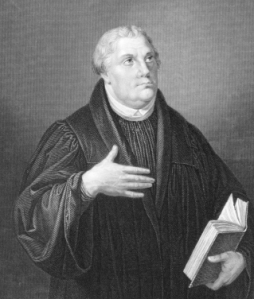Tags
Desiderius Erasmus, Martin Luther, Protestant Reformation, Protestantism, Robert Sapolsky, source of religion
Martin Luther, the Father of Protestantism, had OCD. So what?
Robert Sapolsky, the brilliant professor of biology and neuroscience at Stanford, has made his field accessible and entertaining. But he admits that he sometimes steps beyond his area of expertise–for example, when he prognosticates on Martin Luther, and on the relationship between OCD and religion. Sapolsky, it turns out, is no fan of Luther or of religion.
The mysterious title of Sapolsky’s essay, “Circling the Blanket around God,” expresses his view of the relationship between religion and OCD. It refers to the “fixed action pattern” of the dog who, inexplicably, but nonetheless predictably, circles her blanket several times before finally plopping herself down for the night. A human being suffering from OCD is like a dog circling, Sapolsky writes, except that s/he is unable to stop circling and continues, “exhausted and bewildered.” Thus, the theistic individual—in Sapolsky’s view—circles the blanket around God, circling around and around, “exhausted and bewildered,” but unable to stop.
By his own admission, Sapolsky offers a single original idea in this essay—namely, the idea that OCD individuals started religious rituals. Their attempts, he postulates, to reduce their anxiety by performing set rituals “somehow turns into rules for everyone else.” Somehow. Somehow? Although this is an intriguing idea, it is most certainly not original but rather has preoccupied students of religion for some time. Too bad that Sapolsky doesn’t ask the next, and most important question: what exactly is the mechanism whereby an individual suffering from OCD “somehow” turns his or her anxiety-reducing rituals into “rules for everyone else?”
As an example of a religious figure whose “anxiety-reducing rituals” became “rules for everyone else,” Sapolsky selects Martin Luther. Luther started his theological career as an Augustinian monk but made his way up the academic ranks until he became a professor, among other things, of the Old Testament. His distaste for indulgences (a payment paid to Church authorities to shorten one’s time in purgatory) led him to try to reform the Catholic Church. Instead, he touched off the Protestant Reformation and permanently fractured Western Christianity into its two major families. Luther, scholars agree, and Sapolsky observes, suffered from a bad case of “scrups,” or in everyday speech, from a terrible, OCD-induced, case of scruples.
Monks were expected to meet higher ethical standards than those that pertained to the lay population. His religious order required that he set aside time for an examination of his soul; he was expected to identify every immoral behavior or idea. No matter how petty the behavior or idea, he was to react to them with true sorrow, to repent with true contrition, and to ask God for forgiveness. These steps were critically important; if not followed to the letter, Luther could not hope to be restored, by God, to a state of grace. If he were to die unexpectedly, he would, because he was reprobate, be condemned to eternal damnation.
Luther was convinced that he had failed to repent for every single moral breach. Terrified for his soul, Luther sought relief from his OCD-exacerbated scruples. Nothing worked. Until he discovered a new way to understand the Bible and salvation.
By then, Luther had embarked on academic studies in theology and, having earned a Ph.D., he served as Doctor of Bible at the University of Wittenberg. He became such an adept translator of Scripture that his translation of the Bible into German continues to be widely used today. His painstaking study of Biblical texts eventually led him to develop a novel, but compelling, Scripture-based theology of “salvation by faith alone” (the basic tenet of what would become Protestantism). Luther believed that, because of his faith in Christ, God would not punish him.
Okay, fine. But how did Luther manage to convince so many non-OCD-sufferers to adopt his radical message? By the early 1520s, he had attracted a vast and passionate following, and by the time of his death in 1546, people of all social classes sided with him and with his new creed.
Explanations for this abound. Some point to the wide dissemination of Luther’s books and pamphlets thanks to the advent of the printing press, others ascribe Luther’s ascendance to the spiritual crisis that gripped Europe during the late Middle Ages or to the disgust engendered by the widespread corruption of the Church hierarchy.
Clearly, OCD or not, Luther managed to convince many other, rational, non-OCD individuals, to adopt his way of looking at the world, God, and human beings.
The key observation Sapolsky left out of his essay is this: no novel theologies can succeed, including ones influenced by the OCD terrors of their authors, if they fail to be persuasive. Luther and Lutheranism have persuaded, and continue to persuade a significant number of people. Surely Sapolsky does not wish to impugn the intelligence of the political and religious leaders who took Luther and Lutheranism seriously. The best minds of the era were conscripted by the Catholic Church to challenge Luther, including the highly esteemed Christian humanist Desiderius Erasmus. Most scholars agree that, for all of his learning, Erasmus had met his intellectual match; his arguments failed to erode Luther’s theological claims in any significant way. Other, different arguments would be needed.
To dismiss Luther’s theology because Luther suffered from OCD is a deplorable tactic. There are better, more helpful ways to evaluate Luther’s theology.
Sapolsky’s is a cautionary tale of how data, even when it matches our own opinions, may deserve a second look. Unless, of course, our own most cherished opinions are too fragile to survive being called into question or too fragile to survive comparisons to other opinions. If this is the case then they ought not to survive.
Resource: Robert Sapolsky, “Circling the Blanket for God,” in The Trouble with Testosterone, 241-288 (New York: Simon & Schuster, 1997).



This is a fascinating essay about a plausible set of events.
I would argue that norming activities and the social benefits of group participation would be sufficient — more than sufficient (examples abound of ‘converted minds’) — to have “theologies … succeed, including ones influenced by the OCD terrors of their authors, [though failing] to be persuasive. ”
Persuasiveness is contextual, and if rationalism had developed generally at that time, persuasion would have been, I believe, impossible or highly unlikely.
Persuasion is evangelical main energy among the conservative Christian groups I fled as a youth in Arkansas.
The “OCD-induced” chain-of-events is worth my strong consideration. Thank you.
People with OCD can convince others through guilt, which is something that religions are expert at exploiting.
The idea that Luther managed to convince “many other, rational, non-OCD individuals” is not quite correct – because, as Luther himself pointed out quite forcefully and repeatedly, religion and faith are not rational: “Reason is the greatest enemy faith has.” Luther may have convinced other rational people, but it was not the application of rationality that convinced them.
It’s not difficult to persuade people of the basic religious idea that if we only were a bit more rigorous in our lives, followed the rules better or followed better rules, that we would achieve better outcomes.
This tendency seems to be largely driven by a desire for certainty in an uncertain world: “Just tell me what to do to avoid all this chaos, and I’ll do it!” An intelligent person with an obsessive tendency to follow rules can easily come to seem like a role model: “If only I could be as devout as Luther – God would certainly favor me then!”
I’ve heard more than one person make this postulation about Muhammad and indeed if you read hadith literature he had a very particular way of doing things. His followers continue to emulate him today through observation (in varying degrees) of the same ritualistic manner of completing even everyday tasks.
I wasn’t aware of Luther had OCD. However, it seems, at least from my very limited understanding of the world’s religions, that most of them tend towards ritualism. Indeed, it seems to be one of the hallmarks of religion.
Isn’t systematizing behavior pretty normal among all humans? It’s not just a religious thing. You all probably have a highly ritualized way of washing, making and drinking coffee, conducting visits with old friends, dealing with colleagues, etc. It makes life a lot easier because basic things become second nature and automatic and you can concentrate on more important things simultaneously. Prayer should therefore be ritualized so that consideration of the outward form of the prayer does not overpower the interior state.
And Muslims don’t copy Muhammad in everyday tasks generally, only those which constitute worship. For example, for travel, they do not insist on using camels, they watch TV, wear slacks sometimes (although a rode is more fitting for hot, arid climates), etc.